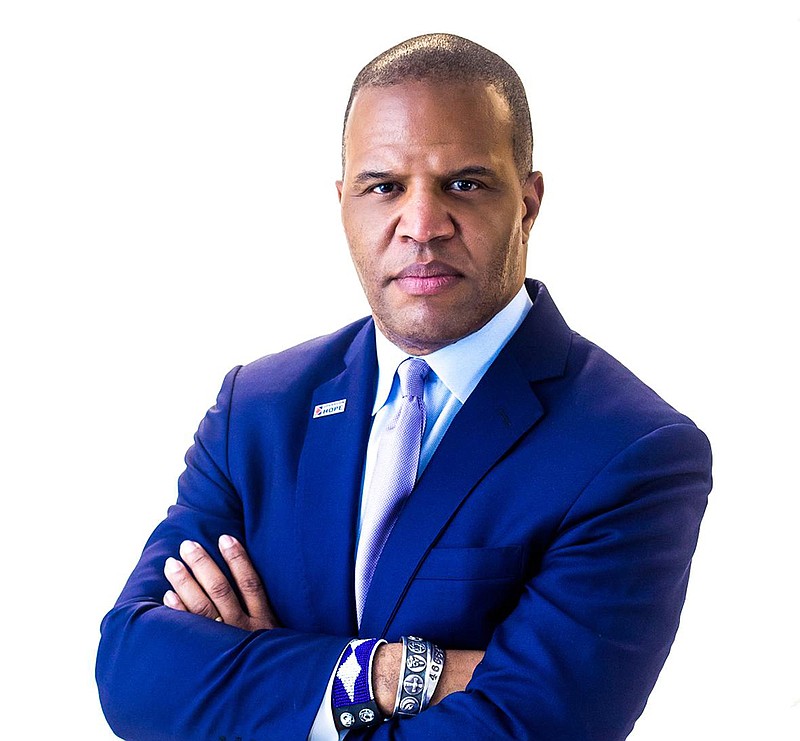With the lowest jobless rate in 16 years and more than $1 billion of new construction in and around downtown, Chattanooga is outperforming most American cities.
"These are great times and we see the pie getting bigger in our city," Chattanooga Mayor Andy Berke told the Chattanooga Urban League Equal Opportunity breakfast Wednesday. "But still, as we know, there are questions about whether those gains are being equally shared in our city."
John Hope Bryant, an entrepreneur, author and founder of Operation HOPE, said the key to broadening the economic gains for Chattanoogans and all Americans is not to reject the capitalistic system that has built the United States into the world's biggest economy. For success, more people need to embrace it and learn how to be financially successful.
Without proper role models or training in how to make and use money, however, many Americans in inner-city or isolated rural areas are being left behind, Bryant said.
Worst states for credit scores
1. Mississippi, 6482. Louisiana, 6543. Georgia, 6564. Nevada, 6575. Alabama, 6576. Texas, 6607. South Carolina, 6608. Arkansas, 6629. Oklahoma, 66310. New Mexico, 66411. Tennessee, 667Source: VantageScore
For those growing up in neighborhoods where economic opportunities are fewer and credit scores in most households are sub-par, unemployment and crime rates are higher and wages and wealth are lower than for most Americans.
Bryant, who has built one of the nation's biggest financial counseling services to help Americans improve their credit scores, said those with sub-par credit ratings struggle to buy a home, start a business or buy a car with reasonable loans.
"Your problem in Chattanooga and Tennessee is not racial and is not political - it's not urban and it's not rural," Bryant said. "Your problem is the sub-par-credit score neighborhood where you see payday lenders, pawn shops, and rent-to-own stores and you don't see aspiration, business development or high-paying jobs."
Credit scores are one of the best gauges for financial health and provide a numerical value that represents a consumer's history with credit, debt, and financial obligations. Such scores are used heavily by lenders and banks in deciding whether to issue credit or a loan to a consumer.
The national average credit score was 682. But Chattanooga's average credit score last year was 658, or 3.5 percent below the U.S. average.
Across the city, Bryant said neighborhoods with the lowest credit scores suffer the most problems with poverty, crime and unemployment.
Bryant said 44 percent of African Americans have credit scores below 620, which is considered sub-par. Only 15 percent of white Americans have a credit score below 620, Bryant said.
"There has never been a riot in American history in any 700 credit score neighborhood," he said.
Bryant founded Operation HOPE when he was 26 years old in 1992 and built the business into the largest financial counseling organization of its kind with 3 million clients and 30,000 volunteers. In Tennessee, Operation HOPE operates 15 offices, including the Eastgate and East 23rd branch offices of First Tennessee Bank in Chattanooga and others across the South in SunTrust offices. Nationwide the business continues to open a new office every two weeks.
Operation HOPE is designed to provide counseling and assistance to help individuals raise their credit scores by on average of 120 points within two years.
"Poverty has nothing to do with money," Bryant said. "Half of all poverty is low self esteem and lack of confidence in yourself. The other part of poverty is crappy role models and a poor environment. If you grow up with nine persons in poverty, you are probably going to be the 10th person in poverty."
Bryant said consumer and economic education is vital to overcoming the barriers to breaking out of poverty because too many Americans are not taught those skills at home and most schools have abolished home economics courses.
"It's the most important thing in our families and our economy, but we're not teaching our children how to run a household, how to make a budget or how to raise kids," he said. "We're the largest economy in the planet with 70 percent of our GDP based on consumer spending, but we just wing it."
Bryant applauded the Urban League in Chattanooga, which works to promote diversity in hiring and promotion and provide education, training and job placement help for disadvantaged and underrepresented persons. In doing so, the Urban League, offers hope and encouragement essential for success in America's economic system, Bryant said.
Contact Dave Flessner at dflessner@timesfreepress.com or at 423-757-6340.
